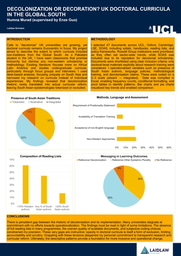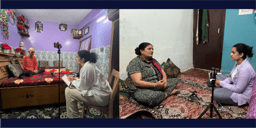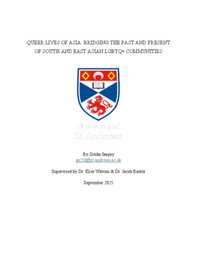Queer Lives: Narrations of Research Abroad (May 13)

May 13th, 2024 – Monday
Monsoon season in Mumbai generally begins in June. For about three months, the city sees daily rainfall that leaves streets flooded and buildings waterlogged. Until then, the temperature rises, offset only by an occasional breeze or two; the skies are blue and clear, with no relief from the suffocating heat in sight.
I am surprised, then, to arise Monday morning to trembling storm-clouds. Strong winds blow through the living room, leaving knocked-over flowerpots and photo-frames in their wake; I scramble to pick them up, running my fingers through the soil. Two leafy plants sit on either side of the sofa – or sat, I should say. They fall once, and we pick them up and put them back in their place. They fall again, and then again – and eventually we bow to the winds and move them to another room. I resume my seat on the window-ledge, laptop in hand, and begin my work for the day.
While the purpose of my research trip is to collect oral histories and conduct interviews, my project also requires a significant amount of conventional source-based research. As my morning is free, I decide to spend the time putting together a reading list for myself – a task that seems simple at first, but actually calls for several hours of combing through library material. There is no better place to work than the living room couch, though, which is positioned right in the middle of a delightful cross-breeze flowing between the open windows. As it passes, it tangles my hair and blows through my ears; if I listen hard enough, it almost sounds like a song.
By early afternoon, I have compiled a solid list of articles on Indian LGBTQ+ history and politics and finished transcribing a previous interview; I’m satisfied when I set my computer down and head to the dining table. Lunch today features idlis, a savoury cake made of rice and lentils. It is accompanied by sambar, spicy podi, and dahi – the merits of which you should be familiar with, if you read yesterday’s blog. I will also take time now to expound on one of the defining products of Maharashtra, which can currently be spotted in any corner of Mumbai in milkshakes, smoothies, ice creams, or just plain, a dozen packed tightly in cardboard boxes. I am talking, of course, about the alphonso mango, grown exclusively in the port city of Ratnagiri. It is almost tradition to eat a mango after a meal; the sweet, rich taste is almost indescribable.
I return to work after lunch. Sifting through articles always takes more time than I expect, as each one I find requires a quick read-through. I also begin to prep for a call I have later in the day with a member of one of Mumbai’s largest LGBTQ+ organisations. I am meeting them down the week in-person at a city festival, but we agree to speak beforehand as well. It’s quiet, solitary work, so I sit inside, humming softly alongside the air conditioning.
As I’m going through my notes, I hear a distant rumble – and then suddenly my appa and Revathi Auntie are calling me outside. The reason becomes clear when I enter the living room and notice the windows, wet with the first rain of the year. We draw the glass aside and perch on the ledge, thrusting our hands out to catch the water on our fingertips. The drops slide down my hands, cool and light, leaving a thin trace behind.
It’s unconventionally early for the rain, and unfortunately that means that tomorrow is going to be hotter than any day so far, but for now the three of us crouch in the corner of the room and watch as the trees grow green, stripped of layers of dust. Every few moments, a low growl of thunder shakes the air, and I instinctively duck inside, poking my head back out once it stops. We sit, like that, for nearly an hour, eyes fixed on the rain and the trees and the colours that jump out under the water.
The rain does eventually stop. The sun re-emerges, washing the room in warmth, and I reluctantly head back into the comfort of the bedroom. The timing could not be more perfect, though, as it’s only minutes before my call. I spend the next hour speaking with my interviewee, who I am initially nervous around but soon warm up to. They are extremely inviting and friendly, and I am eagerly looking forward to meeting them in person in a few days. After we discuss our plans for the festival, I introduce a few of my questions, and just as in my previous interview, their hopes for the future stand out to me. They first note the need for marriage equality, just as my earlier interviewee did, but their concluding remark is surprising; they hope that in ten years, their organisation no longer exists. I’m curious, but before I can ask why, they elaborate: if their organisation no longer exists, they say, it means there is no reason for it to exist. If there is no reason for it to exist, it means that queer communities no longer must fight or be fought for – it means that equality and acceptance have fully been achieved.
By the time I conclude the call, the rains have stopped fully, and Revathi Auntie is waiting to take us around the Bandra markets. After a short auto ride, we arrive at Waroda Road, a narrow street that crosses through the traditional parts of Bandra and is home to several well-known cafes. Each side of the road is full of bungalows and cottages, and smaller side-paths branch out like tributaries from a river. The rain has washed away all hints of grey, and the street is alive with vibrant greens, oranges, pinks, and yellows. I photograph every street-corner, sign, and shop, taken in by the inherent charm of the old town.
We stop at a couple of cafes quickly, but dinner is at Janata Bar, a local staple. From the outside, it looks extremely narrow - I can only see a few chairs and a counter – but the glass doors give way to a spacious interior. The restaurant serves several Bandra staples; we first sample the chicken curry and neer dosa. Unlike the crispy dosa I am used to, neer dosa, literally translating to water dosa, is light and soft. Although I am full after the dosa and curry, we cannot leave without having Bombay duck – which, despite its name, is actually a type of fish.
Pools of water have settled in the roads by the time we head back home, a reminder of the May rain. When I sleep, I try to picture the sound and the sight of the afternoon shower – the clear, clear green that broke through on every leaf, and the feeling of the droplets on my palm.




Please sign in
If you are a registered user on Laidlaw Scholars Network, please sign in